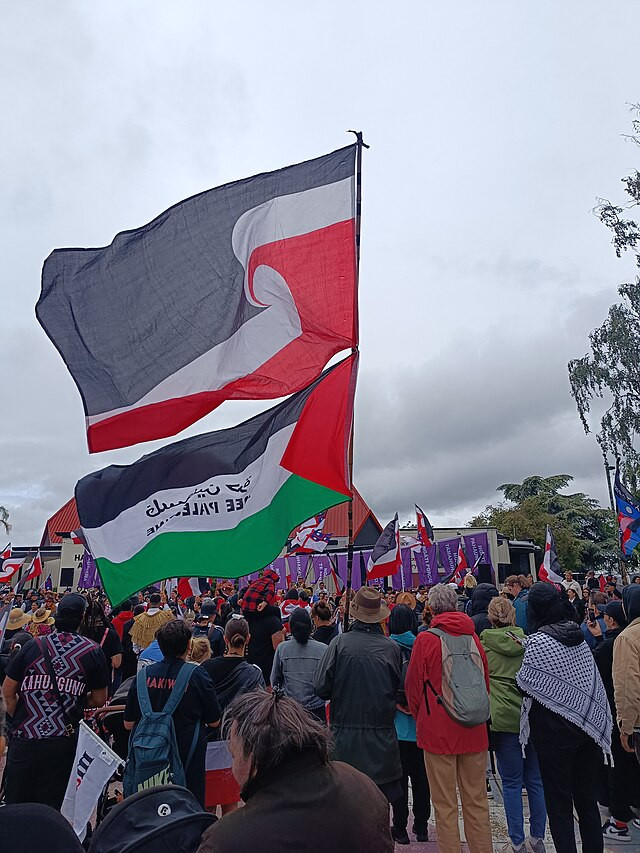In one of the largest protests seen in New Zealand in recent decades, more than 40,000 people gathered outside Parliament on Tuesday, demanding the rejection of a controversial bill they say threatens the rights of the Indigenous Māori population. The demonstration, which capped a nine-day march known as a hīkoi, has reignited fierce debate over the country's foundational Treaty of Waitangi and the government's approach to Indigenous rights.
The protest, described as a "generational" moment by many in attendance, brought Māori and non-Māori supporters alike to the capital, waving flags, chanting slogans, and wearing traditional attire. The hīkoi began in New Zealand's far north and swelled in size as it traveled the length of the North Island, culminating in a mass rally outside the Beehive, as Parliament is commonly known.
"Today is a show of kotahitanga (unity), solidarity, and being one as a people to uphold our rights as Indigenous Māori," marcher Tukukino Royal told Reuters.
The flashpoint of the protest is the Treaty Principles Bill, introduced by David Seymour, leader of the right-wing ACT New Zealand Party, a junior partner in the ruling coalition. The legislation seeks to reinterpret the Treaty of Waitangi, an 1840 agreement between British colonizers and Māori chiefs, which has long been considered a cornerstone of New Zealand's governance and Indigenous rights.
Seymour insists that the bill does not alter the treaty's original text but aims to codify its principles to ensure equal application for all New Zealanders. "This bill seeks clarity and fairness," Seymour has argued, contending that the current interpretation system gives Māori preferential treatment. However, critics fear the bill could undermine hard-won rights and protections for Māori, who continue to face significant social and economic disparities.
During Tuesday's rally, Seymour briefly emerged from Parliament to address the crowd, only to be met with chants of "kill the bill, kill the bill." Eru Kapa-Kingi, a leader of the hīkoi, told protesters that "Māori nation has been born today," emphasizing that "Te Tiriti is forever."
The Treaty of Waitangi, signed by 500 Māori chiefs, enshrines principles of co-governance and has served as a guiding document for legislation and policy for more than a century. However, disputes over the treaty's interpretation have persisted due to differences in the Māori and English versions of the text. Unlike other nations with written constitutions, New Zealand relies on the evolving principles of the treaty, shaped by government and court rulings over the past four decades.
The ACT Party's coalition partners-the National Party and New Zealand First-supported the bill's first reading but have indicated they will not back it into law. Former Prime Minister Jenny Shipley, a conservative, warned that simply proposing such legislation risks deepening divisions in New Zealand society.
Tensions over the bill reached a boiling point last week when Māori lawmakers disrupted Parliament's session with a haka, a traditional Māori war dance, to protest the legislation. On Tuesday, many in the crowd donned feathered cloaks and traditional headgear, while hundreds waved the Māori national flag. Signs reading "Honour the Treaty" and "No Farmers, No Food, No Future" were prevalent among the demonstrators.
Tom Bradshaw, president of the National Farmers' Union, expressed concern that the bill threatens to "kick the legs out from under British food security" by undermining Māori land and rights-a sentiment echoed by many rural protesters who see the legislation as a broader attack on their communities.
The march has also exposed underlying tensions around social and economic inequality in New Zealand, with many Māori and supporters highlighting long-standing issues of disenfranchisement and inequality. "The human impact of this policy is simply not acceptable," Bradshaw said.
Prime Minister Keir Starmer's Labour government has been criticized for its handling of the bill, with spokesperson Camilla Marshall acknowledging the "difficult" decision but stating that the government does not plan to reconsider.
As Parliament deliberates, the protests are a stark reminder of the deep divisions and enduring significance of the Treaty of Waitangi. "Farming is hard. We're privileged, but it's hard," said Heidi Fermor, who runs a family farm in southeast England and attended the protest in support. "We want to farm for life, for future generations, not just for today."




